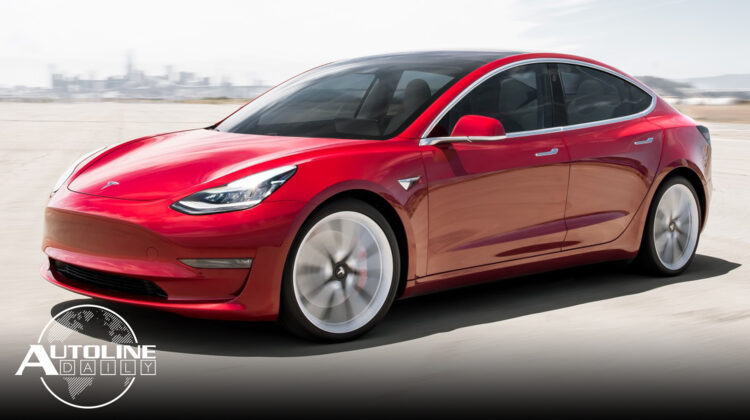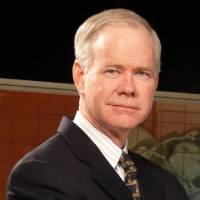
Listen to “AD #2972 – Autopilot Rated #1 In China; Fisker’s Business Model Inspired by Apple; U.S. Car Market Not Slowing Down” on Spreaker.
Follow us on social media:
Runtime: 11:16
0:39 U.S. Car Market Is Not Slowing Down
1:24 Autopilot Rated #1 In China
2:17 Tesla Short Seller Changes Tune
3:32 Daimler Shares Fuel Cell Semi Details
5:13 Volvo Launches Electric Semi-Truck Sales
5:41 Renault & Faurecia Partner on Electronic Parts Repair
6:59 How & Why BMW Acquired Mini
8:23 Fisker’s Business Model Inspired by Apple
Visit our sponsors to thank them for their support of Autoline Daily: BorgWarner; Bridgestone, Hyundai and Intrepid Control Systems.
This is Autoline Daily, the show dedicated to enthusiasts of the global automotive industry.
U.S. CAR MARKET IS NOT SLOWING DOWN
Some news reports say the U.S. car market is slowing down. But all you Autoline Daily viewers know that once you adjust for the daily selling rate, sales are actually going up. Here’s another data point that drives that home. People are buying new cars faster than the industry can make them. Data from Ward’s Intelligence shows that in October people were buying 48,000 new cars a day. Last month, that jumped to more than 51,000 a day, which led to a drop-in inventory. The days’ supply went from 59 days in October to 55 in November. Remember, the industry is running flat out right now and yet it can’t keep up. So don’t let anyone tell you the car market is slowing down.
TESLA AUTOPILOT RATED #1 IN CHINA
Consumer Reports says Cadillac’s Super Cruise is the best driver assistance system and that Tesla’s Autopilot is a distant second. But in China, an auto group called 42HOW, just ranked Tesla’s Autopilot, in a Model 3, as the best driver assistance system in the country. It beat out 10 other vehicles by a fairly wide margin, while a Cadillac CT6 with Super Cruise came in at number seven. BMW and NIO ranked number 2 and 3, respectively. The systems were graded on a number of different driving situations like handling traffic, lane changes, navigating curves, night time driving, automatic parking and how they performed in the rain. Autopilot scored the highest in all categories except automatic parking and driving in heavy traffic.
TESLA SHORT SELLER CHANGES TUNE
And in other Tesla news, one of its biggest skeptics is changing his tune a little. Jim Chanos, a guy who’s been shorting Tesla’s stock for years, reduced his bet against the EV maker. In an interview with Bloomberg, the hedge fund manager says he’s never spoken with or met Elon Musk but if he did he would tell him “job well done so far.” That’s quite the back handed compliment but a compliment nonetheless. He says Tesla isn’t being valued as an automaker rather it’s valued on Musk and he’s the reason people own the stock. As you know, Tesla’s stock surged recently and the company is now worth more than half a trillion dollars.
DAIMLER SHARES FUEL CELL SEMI DETAILS
The CEO of Mercedes Trucks & Buses, Martin Daum is doing a series of podcasts, called Transportation Matters and the latest one about fuel cell semis has some pretty interesting tidbits. The first is that Mercedes is aiming to have its upcoming fuel cell trucks run on liquid hydrogen. Vehicles like the Toyota Mirai, Honda Clarity and Hyundai Nexo rely on storing hydrogen gas in high-pressure tanks. As a liquid, it takes up less space, so you can have more of it, which means more range. But it’s not without its drawbacks. Liquid hydrogen has to be stored at cryogenic temperatures, -252 Celsius or -423 Fahrenheit. That requires a special tank as well. And it’s highly flammable, so special precautions have to be taken with things like the electrical system and how close it is to really hot objects. Now let’s add in this next bit that was talked about. Daum says the average long-haul fuel-cell semi-truck would probably consume about 10 tons of hydrogen a year. That’s far less diesel fuel than a typical semi would use in a year, but the infrastructure for refilling with hydrogen gas is teeny tiny, where do you fill up with liquid hydrogen? And here’s the last thing. Even with its boldest predictions, Daum says by 2030 a fuel cell BEV truck will still be more expensive than a diesel truck. So, while fuel cells make a lot of sense for commercial vehicles, without incentives they’re still a long way off.
VOLVO LAUNCHES ELECTRIC SEMI-TRUCK SALES
Speaking of electric trucks, Daimler’s new partner in fuel cell trucks, Volvo just launched sales of its battery powered VNR Class 8 semi. It’s available in 3 configurations, which all come with a 264-kWh battery pack that provides up to 150 miles of range. While Volvo is kicking off sales to commercial fleets, actual production of the trucks doesn’t start until early next year.
RENAULT & FAURECIA PARTNER ON ELECTRONIC PARTS REPAIR
With so much technology in vehicles repair costs are shooting through the roof, but Renault is helping out with that. It partnered up with supplier Faurecia’s electronics division to offer repair for in-vehicle infotainment systems, engine ECUs, dashboards, screens and electronic control units. Renault repair centers will send the part to Faurecia, who then diagnoses, repairs and performs a final check before sending it back, which can take 3 to 5 days. And it sounds as if it’s not just limited to Renault vehicles. Over 1,000 products from 23 vehicle brands are on the list of electronics that can be repaired. Here’s one last wrinkle to this story. As part of its merging with FCA, PSA had to sell off a significant portion of its stake in Faurecia. We wonder if that’s why Renault is now able to partner up with the supplier?
HOW & WHY BMW ACQUIRED MINI
This Bernd Pischetsrieder, the guy who just got tapped to become the next chairman of Daimler, is turning out to be an even more interesting fellow than we thought. Yesterday we told you how he stole Rolls-Royce right out from under Ferdinand Piech’s nose. That led to a viewer comment from Kevin A that Pischetsrieder is related to Sir Alec Issigonis, the designer and engineer responsible for the Morris Minor and the Mini. Turns out Pischetsrieder is a first cousin once removed. Then viewer Kit Gerhart wondered, “Is that why BMW saved Mini… ?” Pischetsrieder was the chairman of BMW from 1993 until 1999. A year after he took that position, in 1994 BMW purchased the Rover Group, which included the Mini and Land Rover brands. It’s said he made that purchase, in part, to get his hands on the Mini brand because of the family connection. So, not only do you know why Volkswagen has Bentley and BMW Rolls-Royce, but also why BMW has the Mini brand. Oh, and one more thing. GM Veteran had this to say of Pischetsrieder, “It’s also fascinating that he will now have presided over each of the top three German auto companies. Can’t think of anyone else who has done that.” We can’t either. Can you?
FISKER TAKES INSPIRATION FROM APPLE
Henrik Fisker was our guest on Autoline After Hours yesterday. That show is jam packed with a lot of great information. Henrik is coming to the market this time with a completely different business plan than anyone else is using. He’s going to outsource almost everything instead of making it in-house. And his inspiration came from Apple. Take a look.
“Well look, let’s start by looking at a great example that’s out there that was my inspiration: Apple and Foxconn. You know Apple don’t make their own phones, and I don’t think they’ve done too shabby. And I don’t think anybody questions their ability. So that was really the inspiration for this and that’s where we’re really turning the channel-view of the industry upside down. But it goes deeper than that. It’s really about getting into volume, getting into cost effectiveness and efficiency. So, for example, with Magna, you know I think they’ve built over three and a half million vehicles. They are absolute experts. They know how to make a high-quality car in the fewest hours, and that’s an experience they’ve built over decades. And I honestly don’t think there’s any startup that can quickly whip up that experience over a couple of years. And so you’ve seen some of the other startups that are producing electric vehicles, one here in America and another in China, they’ve both been very open about how difficult it was to get the production up and running. And as I said before that’s not something that we want to go out and brag about, how great we are making the car. I don’t think we need to make the car to create IP, to create value, or to be differentiated. If we have a high-quality car that’s important for me and that’s important for our customer.”
When Henrik talks about turning the channel view of the industry upside down, he’s talking about turning the supply chain upside down. And when he refers to certain EV companies in America and China running into manufacturing problems, he’s referring of course to Tesla and NIO. Henrik sure had a lot of interesting things to talk about and you can watch that entire interview on our website or our YouTube channel.
And that’s all we’ve got. Thanks for watching and have a great weekend.
Thanks to our partner for embedding Autoline Daily on its website: WardsAuto.com

John McElroy is an influential thought leader in the automotive industry. He is a journalist, lecturer, commentator and entrepreneur. He created “Autoline Daily,” the first industry webcast of industry news and analysis.







